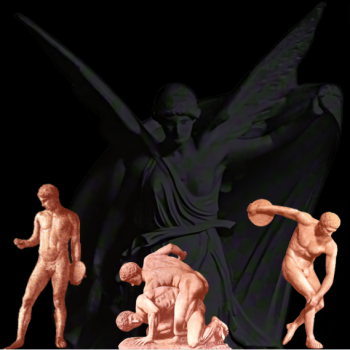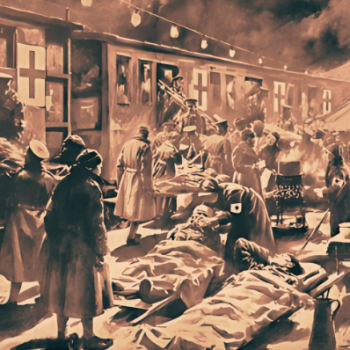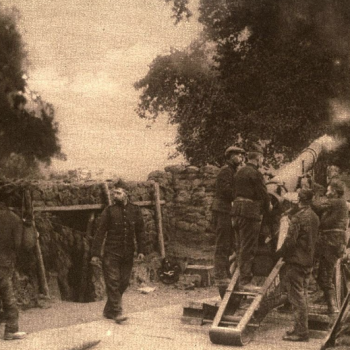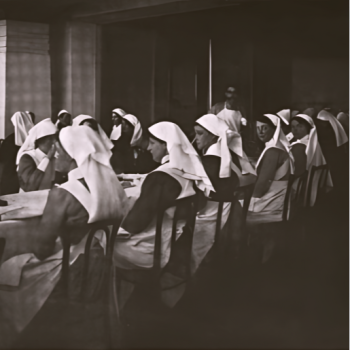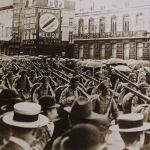PART VI
A FLAGRANT INSURRECTION
The longer I stayed in Brussels, the more I saw of relentless oppression on the part of the Germans, of growing and reckless defiance on the part of the Belgians. For every man who was deported or shot, ten seemed to spring up to avenge him in some strange and unexpected way. Yet the shooting continued. Denunciations were aimed at those in the highest positions of authority as well as at the most obscure, and the slightest suspicion of a petty official, or even an anonymous letter, was enough to seal the fate of the accused person. No one was safe, and we all knew it. I think the espionage was the worst feature of life at this time, for we could go nowhere without the feeling that treacherous hands might seize any one of us at any moment. We had to be careful of the least thing we said or did in public, perhaps in the trams more than anywhere else. German spies, both men and women, were thick, and rode in them day and night; some of the women spies were reported even to be dressed as nuns, and we never knew who might be sitting beside us.
There were heart-racking scenes in the streets too—scenes which seemed to burn themselves into your memory. I recall one day as I was walking down the Rue du Marché aux Herbes, in the middle of the town, that I noticed a man just ahead of me strolling quietly along with his wife. Suddenly I saw a German officer of low rank, accompanied by a couple of soldiers, approach him from the rear, and without warning lay a heavy hand on his shoulder. No word was spoken; no word was necessary; the man knew but too well what it meant— that he was “ suspect”; that his turn had come. I saw him go white— how could he help it; I heard the agonized protests of his wife. Then I saw him hurried away, pushed along like an animal, his wife following close in the desperate hope that she could save him, pulling at the sleeves of the soldiers, imploring them to listen, till at last she was literally beaten off; and I knew that if I could but learn that man’s name, I would find it among other names of the fusillés the next day. For the firing squads were busy. If you stopped to read one of the affiches—blood-red they always were—posted up at street corners, you would see lists of the names of men and women alike, who had been shot that morning for one supposed offense or another. Then the following day (if again you stopped to look) you would find a fresh blood-red affiche pasted over the last, and so on. The martyrdom increased; the strangle grip tightened; the Germans were trying their best to crush the spirit of the Belgians— but they never succeeded in doing so. Though they were too dense to recognize it, or too arrogant to admit it, they had, as a matter of fact, met a force superior to their own.
We had wonderful bits of news from time to time, which illustrated this; news which sifted through, we never knew quite how, after some of the mock “ trials” of well-known Belgians, who had been arrested, but who were too prominent to make it advisable to shoot them unceremoniously. The “trial” of the elderly Comtesse de Jonghe made a great stir. Summoned to appear before a court martial, because she had attempted to defend her little granddaughter, roughly handled in the street, she was faced by rows of German officers spangled with decorations. As usual, no lawyer for the defense was permitted. Seating herself calmly, she refused to stand when ordered to do so. When, as a matter of form, she was told by the presiding officer, to give her name, she replied, haughtily:
“It is far more important that you tell me yours; it may be of service to me in the future.”
When accused of having done something—I forget now, what it was, but something which she had not done, she retorted with spirit :
“You know perfectly well that is a lie.”
And when at the end of the trial (her punishment having been pronounced), all the officers solemnly rose to take the final oath together, she swept her eyes over them in fine scorn: “Le serment allemand!” she laughed derisively, “On le connaît déjà!“
One can imagine not only the fury, but also the embarrassment of those men, for the Comtesse de Jonghe held a position of importance; her husband, during his lifetime, had been Minister at Vienna, and she was known personally to at least one of those who were present in that room—the young Graf Metternich, who had made the original accusation, though he had, before the War, actually been a guest at her house in Brussels.
This trial became quite an affair, which, though it was only one of many, is not surprising considering the rank of those concerned; but there were the obscure victims of German oppression; men and women who, in any real sense, never had a trial at all, because they were too inconspicuous to be missed— why waste a trial on them? Yet their spirit was the same, unbroken, defiant, like the young Belgian woman, condemned to be shot at sunrise, who spent the last night of her life, while in prison, fearlessly singing La Brabançonne, and crying in a loud voice, “Vive le Roi!”
The Belgians were not only openly defiant, however. There is a negative insolence which can be more exasperating, more defeating, than flagrant insurrection, and it was in the trams, perhaps, that one had the best examples of this, for it was not at all uncommon to see a fairly well filled first class compartment empty itself with astonishing rapidity, into the second class, when a German or two entered, and I confess it used to afford me great satisfaction to notice some of the more susceptible Germans color with annoyance when this occurred. The meaning of the unanimous exit was too pointed to be lost even by them. But it was the mock courtesy, so deliberate as to be humiliating, so polished as to give no possible excuse for revenge, which was the best of all. A Belgian gentleman, known to some of us, found, on one occasion, that he was on the point of getting into a tram at the same moment as a German officer. They collided. The German, his dignity ruffled, remarked with what was intended as biting sarcasm:
“Après vous, Monsieur!”
Whereupon the Belgian, with a cool bow, stood aside, saying in his turn:
“Mais non, Monsieur, après vous; je suis chez moi.”
I fancy that even the most thick-skinned of the Germans in occupied Belgium must sometimes have wondered if, after all, the “ mailed fist” was the one and only method of dealing with a “conquered” enemy.
As the long, dark winter months of 1914-1915 slipped by, conditions grew wors; restrictions increased, and with them came more suffering. In Brussels, though little material damage had been done in the town itself, we found life sad and precarious enough, but when, with a tightening of the heart, we listened to the distant boom of the guns on the Yser, where we knew that a fight to the death was going on, we realized that, after all, our days in Brussels were relatively uneventful. I had been told repeatedly, that if you wanted to see real War-time conditions, you must go into the provinces. So, when toward spring I was given a short respite from work at the hospital, I determined, if possible, to see these things for myself; to learn at first hand from the very people who had suffered the most, something of what those sufferings had been. It was not easy to get the necessary passes; private citizens were not supposed to circulate, and getting from place to place was a problem at best. Fortunately, just at this time, I met an American woman who was about to start on a semi-official tour of certain provincial localities, in the hope of tracing some English girls, known to have been left as pensionnaires, just before war broke out, in one or another of the many convents scattered over Belgium. Only fragmentary news of these girls had reached the distracted parents at home, and every effort was to be made to discover and repatriate them. Offering my temporary services for this work, therefore, I again found my “official excuse” for making this impromptu tour of inspection—though I did not, of course, so name it when being interviewed by the authorities. I had some difficulty at the Kommandantur. Why did I want to go into the provinces? What was I going to do when I got there? Then (having mentioned the name of a certain town which we wished to visit), to my unbounded surprise:
“That is too near the frontier. You cannot go there.”
That wretched frontier! I had hardly had time to think of it since I had crossed it, months ago, and here it was, staring me in the face once more. What was the meaning of it? Despite the unsolved mystery, however, I got my passes, and again I left the Kommandantur, and the memory of the frontier with it. No time to bother about little things like that! But how well I remember the day we started, and the severe “jolt” I received. With our small hand bags, we had just entered a tram which was to take us to the station and our train. As we seated ourselves, something—I have never known what—made me turn my head quickly, in the direction of the rear platform, where a German officer, and a man in civilian dress, who had stepped on immediately after us, were standing. I was just in time to see the officer point at me (I must have taken him by surprise, turning so quickly) and say to his companion: “It is that one.” I confess I had a very cold shiver indeed. It was the first time, so far as I knew, that I had definitely been marked “suspect,” though very likely I had been watched and followed for a long time without noticing it. The only thing to do now, of course, was to appear to have seen nothing, and to continue my way according to schedule. But it was not altogether pleasant, and I may as well record here that, during my whole tour, this unknown man turned up at the most unexpected places. Evidently I was not allowed for long out of his sight.
We had planned to go first to Liège, and from there get, by cart or otherwise (transport being difficult,) to several of the neighboring towns and villages, where we hoped to find some of the English girls who were on our list. I had never been in that part of the country, and it was very much in the spirit of a pilgrimage that I found myself embarking on this journey; for the world will never forget (at least I hope it will not) that tiny corner of Belgium where the first stern and desperate stand was made, in under-garrisoned fort, in rustic village, or in open field, against that grey-green horde of invaders, which swept like a whirlwind over the frontier in the pale, early light of that August dawn, 1914. It is, perhaps, difficult to imagine, after this lapse of years, and with the weight of “peace time conditions” to deaden our memories and our sympathies, the blank consternation which must have reigned in those little outlying towns and hamlets, when the inhabitants found themselves suddenly overwhelmed. German troops under von Emmich had, it is true, been concentrating for several days on the frontier, but the Belgian peasants, paying little heed to what they thought “ idle rumors,” had no real conception, until it was too late, of the danger which threatened them, for Germany invaded Belgium before any declaration of war had been made, I and many of those unhappy people, caught in the first terrible onslaught, were, on that fateful summer morning, almost literally wakened out of sleep to find them selves surrounded and overpowered. Yet, even with that fearful shock of surprise, how little they guessed all the horrors that were in store for them.
The Germans crossed the Belgian frontier on the same date, and it has been said, almost at the same hour that they had invaded France in 1870—they are addicted to the spectacular. They swarmed into the peaceful Belgian countryside along several different routes, running west from Aix-la-Chapelle and Malmedy, their first objective being, of course, Liège. Between that great fortress and the frontier to the south-east, there stretch many miles of beautiful, hilly country, at times heavily wooded, where deep shadowy gorges and glens shelter swift-running mountain streams, cold and turbulent. It is the northern extremity of the Ardennes, a country which would have been easy to defend, and difficult for large armies to penetrate, save that the invasion was wholly unexpected. To the north of Liège, a great table-land sweeps westward—the best kind of country for the movement of troops on a large scale—but before reaching it, the Meuse would have to be crossed, and it was in order to accomplish this that the surprise attack on the little town of Visé was made, for at that point the river was spanned by a strong bridge. As Liège itself was the key to the valley of the Meuse, so the Meuse has been called “the gateway to the Belgian plains,” and it was of the utmost importance to the Germans that before the Belgian army could be fully mobilized, or the French could send reinforcements to dispute their advance, they (the Germans) should secure a firm position on the left bank of the river. Hence it was that, in the night of August 3-4, a small body of Uhlans, and an advance guard of 1,500 infantry packed into 150 motor cars, were rushed forward through Gemmenich, just over the border, these being followed by the slower marching columns. The sound of those galloping horses, and that small army of military cars tearing over the silent country roads, through the summer darkness, must have caused the utmost astonishment and misgiving in the minds of the rudely awakened peasants, who watched them sweep past in their headlong descent on Visé. It was the first intimation they had that war had come.
From the very first the German treatment of the Belgian civilian population was so iniquitous, so monstrous, as to stagger public imagination. Scarcely had the War began, when the whole world was standing aghast at the news which reached it from the burning villages and the sacked and ruined towns—news of the wholesale shooting of unarmed men; of the violation of helpless women and young girls; of the mutilation and butchery of children. This news, coming during the first days chiefly as rumors, grew in volume and vividness until there could no longer be any serious doubt as to the horror of what was happening, and steps were almost immediately taken by the Belgian authorities, to investigate the truth of these rumors. Within a very few days after the War had started, Monsieur Carton de Wiart, the Belgian Minister of Justice, formed, first in Brussels and later continued in Antwerp, a Commission of Enquiry, which probably was the first of these Commissions to be appointed for the investigation of “alleged atrocities”; but there have been many such since that time, and no impartial man or woman who has taken the trouble to read any of the Reports resulting from these Commissions, can doubt the enormity of the crimes for which Germany is responsible.
There is more than this, however, and worse, for, as the result of the investigation, one horrible fact stands out in bold relief, even against the infamous background of the atrocities themselves—the conclusive evidence which proves that these outrages were deliberately planned, perhaps the chief points in the evidence being the striking uniformity in the kind of crimes committed in countries by no means contiguous (Belgium and Poland, France and Serbia,) and also that these crimes, in the peculiarly vile forms known to us, stopped as abruptly as they began. It has sometimes been said by neutrally- minded people (they generally call themselves “fair-minded” ) that brutality and crime always accompany warfare, and that the “alleged atrocities” in Belgium and France were no worse than those of any other war; when troops get out-of-hand, “atrocities” always follow, etc. These same people, however, can find no answer when asked to explain the remarkably sudden termination of these early atrocities. You cannot, on a fixed date, stop wholesale murder and debauchery when these are the simple result of out-of-hand troops. “A deliberate policy of terrorism” is the only explanation.
The worst of these unspeakable barbarities committed by the Germans, known to all the world as “the atrocities,” and being, as they are now recognized because of their savagery, unique in the annals of “civilized” warfare, all happened within the first three months of the War, and then, in their peculiarly revolting and iniquitous character, they ceased. This, of course, does not mean that all atrocities ceased, but, as it has been said: “The crimes of the invasion, and the crimes of the occupation are of a very different order from one another.” When Germany saw that the War was not being won as swiftly and as surely as had been anticipated, and that it was therefore unwise to ignore public opinion, the atrocities on the old scale, and of the original monstrous type, ended. Germany, faced by outraged public opinion with charges (thoroughly investigated and well docketed) of murder, rape and incendiarism, of course denied the truth of these allegations (the noble conduct of the German Army being above question), adding that the German Government had ordered an investigation, and that the results of this were “awaited with calmness and confidence.” The German Government was thereupon invited by the Allied Governments to explain the tragic presence (in certain specified localities of conquered territory) of “the graves of five or six thousand civilians, recently slain.” The answer was: “Man hat geschossen”— that was always the answer. It was maintained that when German troops were fired upon by civilians, reprisals were necessary as well as inevitable; the guilty must be shot in their turn. But even if these legends of the franc tireurs had been true (which, save in rare and isolated cases, could never be proved) the wholesale rape of women and young girls; the bayoneting and strangling of children, even of babies in arms, was still to be explained. The most preposterous, and, to any but a German, tragically ludicrous reasons were sometimes given as excuses for indiscriminate and horrible slaughter. In several cases it was asserted that German troops had been fired upon by girls of fifteen, and this desperado behavior on the part of Belgian children (for the sake of argument supposing it to be true) appears to have caused such blind panic in the breasts of the intrepid invaders, that, in one case at least, a single little girl was responsible for a general stampede, and so intimidated the Commanding Officer (who claimed that he had been the special target at which the young Amazon aimed) that he then and there ordered the execution of eighteen civilians of all ages, including several priests. It is proverbial that the German troops, with their officers into the bargain, had a crise de nerfs whenever an unexpected shot was heard, even when this shot was later proved to have been fired by one of their own men. But perhaps above all other incriminating evidence, is that of the German soldiers— “German guilt was established by the Germans themselves.” The diaries kept by the men in the ranks, and found by the Allies upon the German dead, furnish proof enough that the unspeakable atrocities were “systematically organized”.
Of course, I heard many stories while I was in the provinces. Few of them, however, can be repeated; but even were this possible, they would pale in the writing, for a welter of horrors seems to fill my memory—horrors both heard and seen. It was my experience that few of those simple countryfolk wished to speak of what had befallen them; they were very reticent when telling of their sufferings—it could hardly be otherwise, remembering what those sufferings were. There were no heroics; the agony had been too great. But when they did speak, it made you feel as though you were touching a red-hot coal; an intense, still heat which smoldered.
While stationed in Ghent, I had thought that the adjacent country where I worked with my unit— that towns like Termonde and Alost for instance—showed a state of devastation which it would be impossible to equal anywhere else; that nowhere else could there be such a pall of desolation, such an atmosphere of misery and suffering. But as I look back on it now, there is a strangely indefinable difference between East Flanders as it was at that early time, and the Liège district when I visited it six months later. I think perhaps that the distinction was to be found, not so much in what one saw as in what one felt, and perhaps what one felt, just behind the thin veil of material devastation, was the emotional devastation caused by the very suddenness of the horror which those poor frontier peasants experienced when they found themselves, and those who were dear to them, facing shame and death of a kind they had never imagined. In almost a moment of time, whole families were wiped out of existence—even before they had fully realized that a war had started. It was the kind of horror which, because of its very sharpness, must have stabbed itself with indelible imprint on the surrounding atmosphere, to remain there for long years afterwards. Yet other parts of Belgium suffered just as much, or more; the massacres at Aerschot, Louvain, Dinant, Tamines, were really worse in many ways, than those at Visé— none the less there was a distinction. You could seldom explain the intangible differences which were felt in the regions where the Germans had passed, but those atmospheric changes (if one may so call them) were familiar to us all. I have known many people to speak of them.
Visé was a small but thriving town of about four thousand souls—a happy, gay little town on the Meuse. In one night, it was destroyed, completely, irrevocably. A German describing it wrote: “It vanished from the map.” The terrified inhabitants, when they saw the danger that was threatening them, did not know whether to hide in their cellars or to try to escape. Their hesitation was, in most cases, their doom. When I first saw Visé, in the dusk of a cold and stormy evening—an evening of scudding rack and blustering wind—it was but a mass of blackened, crumbling walls, unimaginably desolate; a sight to make one shudder. Save for a gaunt and stealthy cat or two, moving like shadows, swiftly and noiselessly across the dim, waste spaces (cats always lurked in these ravaged and forsaken towns) there was no living thing in sight. It looked like a place on which a curse had fallen. I got out of the rough, country cart which had brought us to Visé, and groped my way alone into some of the poor tortured houses—pitiful ruins that had once been homes; peeping into the silent, twilight rooms now open to the sky; rooms with tottering walls aslant, ready to crash down, where even in that sad light I could see the spattering of bullet marks which told their tragic story. But the wind shrilled sharply through the openings in the walls, a bitter, crying sound in that silent wilderness, and ghostly faces seemed to crowd too near, so I hurried out again.
At a neighboring village the next day, I met a man whose home had been in Visé, and I asked him if he would tell me about the coming of the Germans there. “ It was horrible,” he said, and I saw the color die out of his face, “ but my loss was like those of many others—I must not forget that.” Then he told me of the madness and the terror of that single night; how whole families had been burnt alive in their houses— houses set on fire by the German troops, following the orders of their officers. He saw these orders given, and the methodical way the fires were started, for he was held prisoner in the street, and watched it all. Many of those poor townspeople, however, had stayed indoors, hoping for safety, not guessing what was taking place; until, seeing the spreading conflagration, they came rushing out, vainly thinking to escape. But the Germans, savagely intoxicated, pushed them back into their burning homes, time and time again, threatening to shoot them whenever they ventured out. Some of the men of the town had been seized, and crowded together in groups in the street, where, encircled by a wall of Germans, they were forced to stand outside their own houses as they blazed and crackled. That is what happened to the man who was talking to me; with his hands tied tight behind him, he was placed directly in front of his home where his family was imprisoned, and he watched the panic-stricken face of his wife, pressed against the window, pleading, beseeching; he heard above the hellish noises all about him, the screams of his own children, as the first hot flames caught, and scorched them—he faltered as he told me of it. Then, when the roof crashed in, and everything there was still, he was marched away with many others, the procession swelling as it advanced through the town, joined by more prisoners of all ages and both sexes. The streets, he told me, were like a vast furnace; the stones were hot under his feet as he passed along. The houses, blazing or smoldering on both sides, were flaming torture chambers where the cries of the dying could be heard; or smoking ruins where charred bodies lay, in horrible contortions. He saw the sweat streaming down the faces of those with whom he marched, for the heat from the burning houses was almost past endurance, and the blinding light made it brighter than day. They were led out into the country, beyond the limits of the town, and there they were herded, without food or shelter, being told that they would all be shot in the morning. There were a great many of them—men and women with little whimpering babies, and young children, crying with hunger and with fright. All that night, he said, he listened to the sound of German troops, moving south along the river, toward Liège. They passed in an endless tide, a grey avalanche in the darkness, which, however, he then realized was not really darkness, because of the glow of the burning town, not far away. When morning came, there was a kind of sorting out, with no particular method so far as he could see, and many were shot as they stood, while others were made to dig graves and bury them. That day, husbands buried wives, and mothers buried children. He was one of those who were turned loose, though he never knew why, and he was now trying to make a fresh start (though he said he had little heart for it) patching together what he could from the wreckage of that one night.
We traveled over a great part of the Liège district, visiting many villages and towns in search of our English girls, and everywhere the stories were the same—loathsome stories of children of two or three and less, with their throats cut, dangling on poles by the roadside, their mothers, first horribly mutilated and finally killed, lying not far off; stories of the ravishing of young girls in the presence of their parents, who, being bound hand and foot, could do nothing to defend them—I talked with two mothers to whom this had happened; stories of the shooting of boys who were “too young to die,” as one of them had protested boldly in the face of a firing squad. You never got to the end of these horrors, and always there was the same comment by the Belgian peasants themselves: “ But we had no warning; we did not know they were coming until we saw them at our doors.” I remember a woman in a little village, somewhat to the north of Battice (I cannot recall the name, for I went to so many) who told me in graphic terms, how she and her husband were drinking their morning coffee on August 4th, when her son, a lad of fourteen, who had just started for some work in the fields, rushed back with the news that German soldiers were pouring into the other end of the village. They listened and heard the sound of heavy feet marching; then suddenly a shot, and an old man’s quavering voice crying out. It was a neighbor of theirs, a man of over eighty, who had by chance been crossing the village street, and who had been shot down for no reason whatever. He had died almost immediately. That first shot, though fired by themselves, seemed to have turned the Germans into wild beasts, she said, and horrible things began to happen almost before she and her husband had time to get up from the table where they were sitting. The Germans came rushing down the village street yelling like demons, shooting in at the windows, breaking down the doors of the houses, bayoneting or shooting people indiscriminately. Within an hour her husband and her boy were both killed at her side, the village had been deliberately set on fire, and she herself, with many others, was then marched out of it (driven out, would be more correct) for several miles along the road, toward Liège. They had to walk in front of the German troops, though they did not know why, nor did they know where they were being taken. When an old woman fell from exhaustion, she was bayoneted in the back, and then kicked to one side of the road; if others so much as stumbled, they were seized and kicked or cut open with a bayonet; a baby, crying too persistently, was shot dead with its mother—one bullet killed them both. At last, after being driven like cattle for many miles, they were told, in broken French by a German officer, that they could return to their village, though there was nothing to return to, for the village was a heap of cinders. And all this time these bewildered peasants who had had no warning that war had come, kept wondering what it all meant—this driving them about the country in front of the Germans—and the woman who was telling me of it said that it was not until sometime later, when she heard of similar experiences in other villages, that she understood the reason for it. Before long, of course, it became a matter of common knowledge that Belgian non-combatants were used as a screen for the Germans, who knew that in this way they were safe from attack by the Belgian Army. It had only been because they did not happen to meet any Belgian troops on that particular occasion, that she and her fellow-prisoners were set at liberty. She said she supposed that people in other villages, farther along the road to Liège, had later been used as a screen in their stead, though she had never, of course, heard.
After we had finished our investigations around Liège, we went on to Namur, and it was in this way that I got to Tamines and heard at first hand what the Germans had done there. The story of Tamines, one of the blackest in the whole course of the War, became so well known that one hesitates to write about it. Yet, for all its familiarity, many of us have ceased to think of it; some have probably forgotten it.
We reached there late one afternoon, and I, wandering alone through the almost empty streets, past ruined houses, telling the old, brutal tale, came at last to the village church, with its shattered belfry and its bullet-splintered walls, and beside it the little graveyard which had become so celebrated—at least to those of us who lived in Belgium. I turned in here, sadly drawn by the long rows of new, wooden crosses, all of the same rude simplicity, and standing as they did in serried ranks, like a dense forest of tiny trees. They filled to overflowing the small enclosure, which had never been planned for so great and sudden a toll of death. These crosses, all of single date, differed only in the names painted roughly upon them—names of men and women and children, of all ages, from childhood to four score years and ten. Hundreds of these graves there were, and all in that one small village, and all in that one small graveyard, lying so quietly on the banks of the little river Sambre which has given its name to a bloody and ruthless massacre. As I stood looking at these little, closely planted crosses, so eloquent in their very roughness, and the evident haste with which they had been made, I became aware that I was not alone. A peasant woman was standing there among them too, apparently absorbed in thought, so I kept very still, hoping not to disturb her. Presently, however, seeing that I was a foreigner (and not a German!) she came quietly over and spoke to me, and as we talked, the usual barriers of reticence gradually disappeared. She was a woman of about forty, I should think; sturdy and strong like one accustomed all her life to work in the fields, but with an in describable air of refinement, none the less; and she told me simply and quite evidently without embellishment, of the utter tragedy of that August day, eight months before.
French troops had already arrived from the neighborhood of Charleroi, she said, and this at first gave them courage, for many stories had reached them of the terrible things which had happened in other towns. But there were not many of these troops, and one day the Germans swept in like a torrent, pushing them back to the bridge across the river, where there was sharp fighting. The French lost the bridge and had to retreat. The firing was, of course, heard in the village, but no one there knew just what was happening, until some of the Germans suddenly returned, shouting and gesticulating.
“It was early in the day,” she said, “and I was at home, when my husband and my two sons came hurrying in, with anxious faces, shutting and bolting the door after them. Then they told me what they had just heard and seen in the village square—that the Germans had come swarming back on the run; that they were livid with hate, shouting that we had fired on them from the rear, while they were fighting the French, and that we were all going to be shot. My husband and I looked at each other in a kind of blank despair, for we knew only too well the way trouble had begun in other towns; we knew what had happened before, for that kind of news travels fast.”
Then she told me of the tumult which started; how people were dragged from their houses into the open; how she saw women and men and young girls and children, standing in bewildered and terrified groups; the men trying to keep in front of their wives and daughters, in order to protect them, though being jostled and prodded by the German soldiers who seemed mad with excitement. It was the same kind of horror which I had heard of over and over again, though for all the sameness, there was never lacking a hellish versatility in the way the Germans did things, for at Tamines they made the men of the town parade up and down, and up and down through the streets that livelong day, while their houses were being looted and then set on fire before their very eyes; while their wives and mothers and children were forced to look on. Hoping to terrorize their victims, mock executions were held throughout the day, small groups of the men being separated from the rest, and stood against a wall, the Germans then firing just above their heads. At intervals too, there were real executions, when some of those poor villagers, thinking that another mock execution was to take place, were shot none the less, and left lying in heaps, no one being allowed to go near them, even though, as in some cases, there were those who still lived and cried for help. Sometimes they were made to lie down in front of the machine guns, not knowing whether they were to be killed or not. Sometimes, again, just to break the monotony, the Germans fired into the crowd of village women, whom they had compelled to follow, killing women and children both. When evening came, and most of the town was burnt, and all save the Germans were sickened by the orgy, between four and five hundred of these men were taken to the village green, near the church, the women again being forced to accompany them. The Sambre flows gently past the green, and it was on the banks of the little river that the final scenes took place. Despite the agonized protests and outcries of the women, who begged for the lives of their husbands and their sons, the men and boys were lined up there, in the gathering twilight, in three long rows, one behind the other; the signal was given, and the firing began, first with rifles, and when that did not do the work quickly enough, machine guns were turned on them. They dropped, of course—scores and scores at a time. Countless numbers fell backwards into the river. If they were still alive, they drowned; if they were dead, what did it matter? The little Sambre ran red with blood, just as at Dinant the Meuse had run red with blood. Some times those who were only half dead, clung madly to the edge, but the Germans, with a thrust of the bayonet, pushed them in again, more wounded than before. Sometimes the wounded were seen trying to swim across to the opposite bank, in the hope of escape, but the Germans picked them off one by one, and the corpses were carried down on the tide. Most of the victims of this unspeakable massacre fell in the village square itself, however, and lay in great, shapeless heaps, the dead and the half dead together. The woman who was telling me of it, and who had been present through it all (her husband and her two sons lay dead there with the rest) could hardly finish her story. The firing continued without break, until not one of those four hundred odd men was left standing, and darkness had fallen. All that night German soldiers crept about among the bodies, looking for those who might still be alive. If any such were found, they were bayoneted at once. With the first light of day a pitiful scene took place, for more of the townsfolk were marched into the square and were forced to dig one long trench, and to bury their own brothers or fathers or sons. My poor peasant woman said that somehow, that was the worst of all, for she buried with her own hands, in that common trench, her husband and her two boys—all she had in the world. “I can never forget their faces,” she said, “nor the faces of the other dead.” It was somewhat later, she continued, that the people of Tamines were able to remove the bodies to the little graveyard, where they were now lying, lying all about us as we stood there talking. “And these are my graves,” she whispered softly, pointing to three close at hand, and exactly like all the rest.
I noticed that each was carefully and lovingly decorated with the usual little bead-flower wreaths— those little flower wreaths which one has grown to care for very much, because of what they mean to those who have lost much; and then I bent toward the three little crosses, and read the names there, and the ages— forty-six, eighteen, sixteen. And the dates— all the same, August 22nd, 1914.[1]
SOURCES:
[1] Volunteer (Dodge, Theodore.) “War Memories: A Flagrant Insurrection.” The Theosophical Quarterly Vol. XXVII., No. 3. (January 1930.): 230-241.




